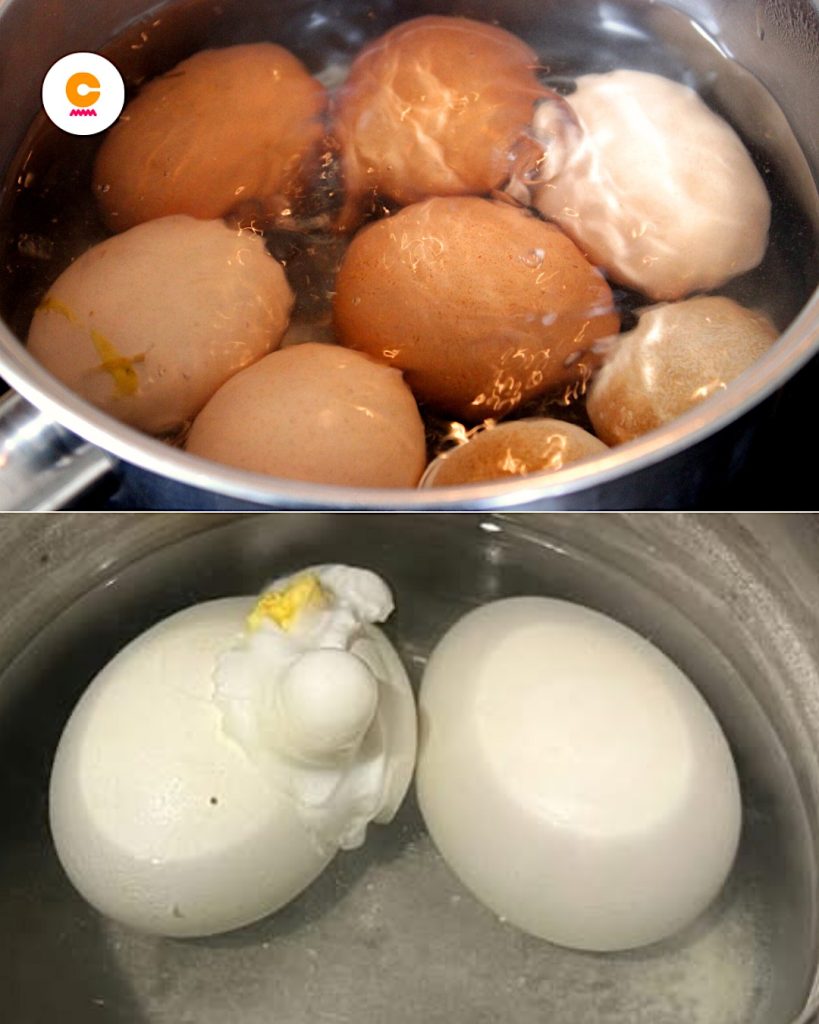4.4. Doubts about Freshness
If you have any doubts about the freshness of an egg, it’s best not to consume it, even if it didn’t crack during boiling.
5. How to Prevent Eggs from Cracking When Boiling
5.1. Ambient Temperature
Remove the eggs from the refrigerator at least 30 minutes before cooking them, to bring them to room temperature and reduce thermal shock.
5.2. Dip Gently
Gently lower the eggs into the water, using a spoon or slotted spoon.
5.3. Cold Water
Start cooking with cold water, rather than boiling. This way, the temperature will gradually increase, reducing thermal shock.
5.4. Add Salt or Vinegar
Adding a teaspoon of salt or vinegar to the cooking water can help seal any cracks in the shell and prevent the egg white from leaking out.
5.5. Don’t Overcrowd the Pot
Don’t overcrowd the pot with too many eggs. Leave enough space between them to avoid bumping and breaking.
5.6. Non-hermetic lid
Use a loose lid to avoid excessive pressure inside the pot.
5.7. Slow cooking
Cook the eggs over low heat, to avoid boiling too vigorously which could cause the shells to crack.
6. What to Do if an Egg Breaks While Boiling
6.1. Add Vinegar
If an egg cracks while boiling, immediately add a tablespoon of vinegar to the water. The vinegar will help coagulate the egg white and seal the crack.
6.2. Continue Cooking
Continue cooking as directed, carefully monitoring the cracked egg.
6.3. Consume Immediately
Consume the broken egg immediately after cooking, following the precautions indicated above.
7. Use Broken Eggs for Other Preparations
Although an egg broken during boiling is not suitable for consumption as a hard-boiled egg, it can be used for other preparations, such as:
- Omelettes: Cracked egg can be added to the omelette batter.
- Savory Pies: A broken egg can be used to bind the ingredients of a savory pie.
- Sauces: The broken egg can be used to make sauces such as mayonnaise or hollandaise sauce.
- Dough: The broken egg can be used to enrich bread, pizza or fresh pasta dough.
8. Conclusion
Eggs breaking while boiling are a common problem, but it doesn’t always mean they should be thrown away. By carefully evaluating the cause of the breakage, the extent of the damage, and following the recommended precautions, you can safely consume a broken egg, avoiding waste and enjoying a nutritious and versatile food. Always remember to keep eggs fresh and take preventative measures to reduce the risk of breakage during cooking.
4.4. Doubts about Freshness
If you have any doubts about the freshness of an egg, it’s best not to consume it, even if it didn’t crack during boiling.
5. How to Prevent Eggs from Cracking When Boiling
5.1. Ambient Temperature
Remove the eggs from the refrigerator at least 30 minutes before cooking them, to bring them to room temperature and reduce thermal shock.
5.2. Dip Gently
Gently lower the eggs into the water, using a spoon or slotted spoon.
5.3. Cold Water
Start cooking with cold water, rather than boiling. This way, the temperature will gradually increase, reducing thermal shock.
5.4. Add Salt or Vinegar
Adding a teaspoon of salt or vinegar to the cooking water can help seal any cracks in the shell and prevent the egg white from leaking out.
5.5. Don’t Overcrowd the Pot
Don’t overcrowd the pot with too many eggs. Leave enough space between them to avoid bumping and breaking.
5.6. Non-hermetic lid
Use a loose lid to avoid excessive pressure inside the pot.
5.7. Slow cooking
Cook the eggs over low heat, to avoid boiling too vigorously which could cause the shells to crack.
6. What to Do if an Egg Breaks While Boiling
6.1. Add Vinegar
If an egg cracks while boiling, immediately add a tablespoon of vinegar to the water. The vinegar will help coagulate the egg white and seal the crack.
6.2. Continue Cooking
Continue cooking as directed, carefully monitoring the cracked egg.
6.3. Consume Immediately
Consume the broken egg immediately after cooking, following the precautions indicated above.
7. Use Broken Eggs for Other Preparations
Although an egg broken during boiling is not suitable for consumption as a hard-boiled egg, it can be used for other preparations, such as:
- Omelettes: Cracked egg can be added to the omelette batter.
- Savory Pies: A broken egg can be used to bind the ingredients of a savory pie.
- Sauces: The broken egg can be used to make sauces such as mayonnaise or hollandaise sauce.
- Dough: The broken egg can be used to enrich bread, pizza or fresh pasta dough.
8. Conclusion
Eggs breaking while boiling are a common problem, but it doesn’t always mean they should be thrown away. By carefully evaluating the cause of the breakage, the extent of the damage, and following the recommended precautions, you can safely consume a broken egg, avoiding waste and enjoying a nutritious and versatile food. Always remember to keep eggs fresh and take preventative measures to reduce the risk of breakage during cooking.

